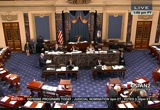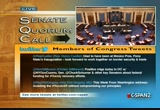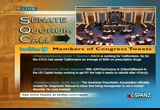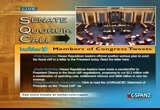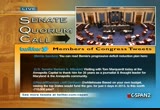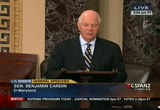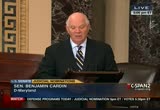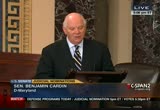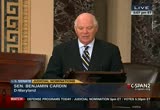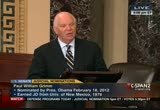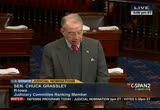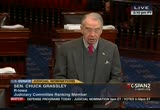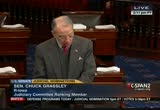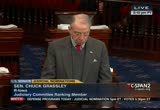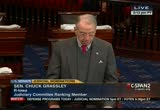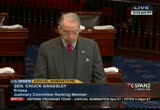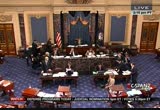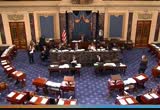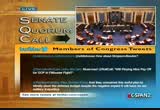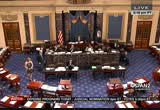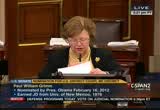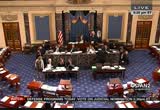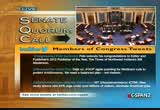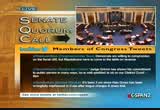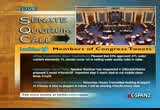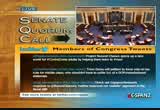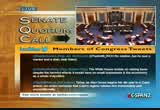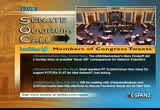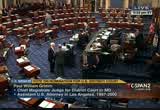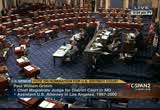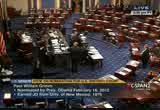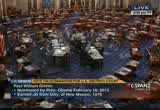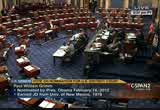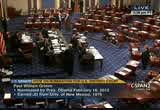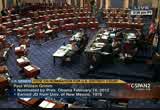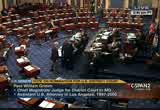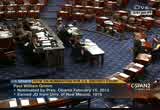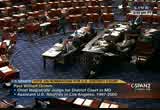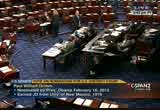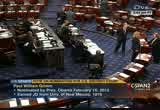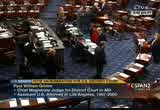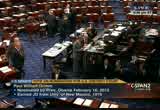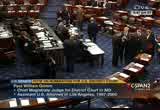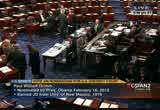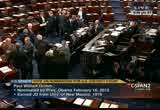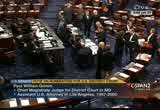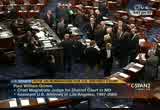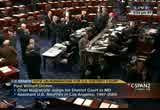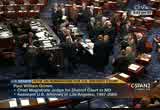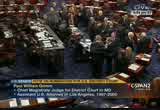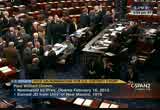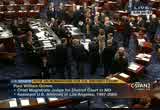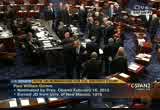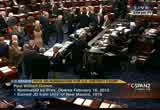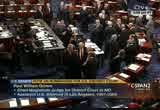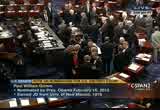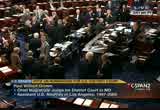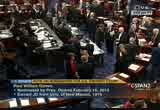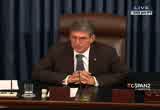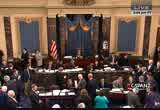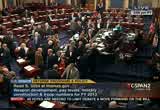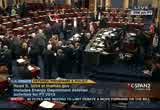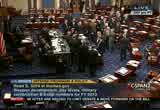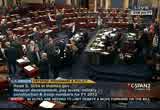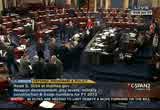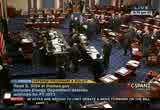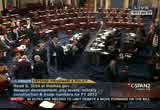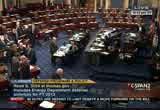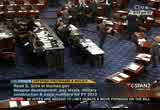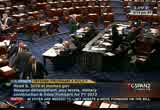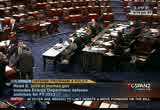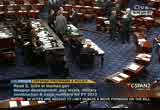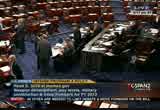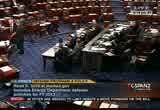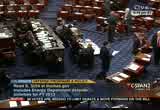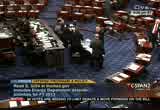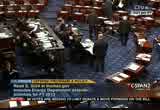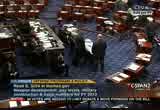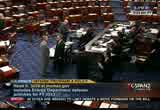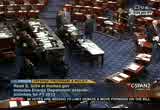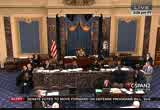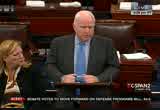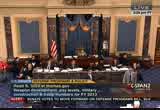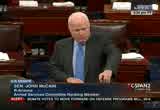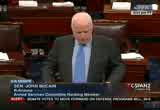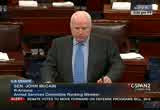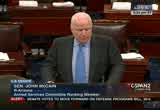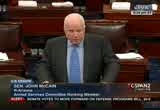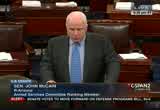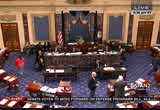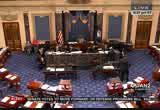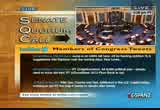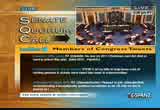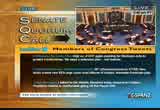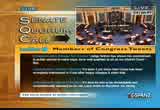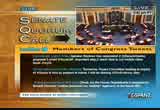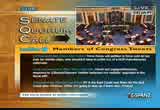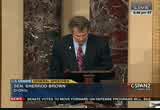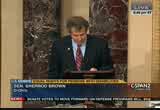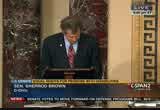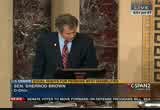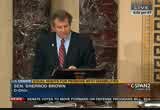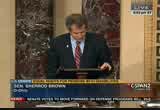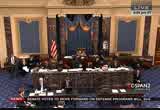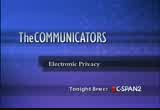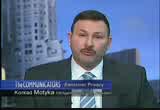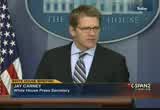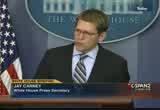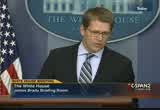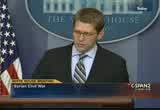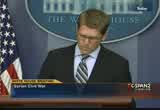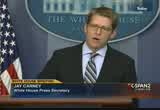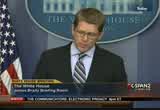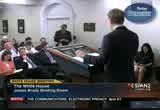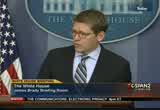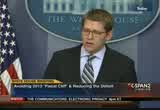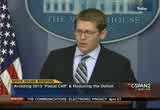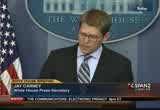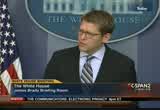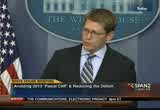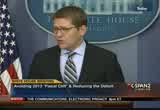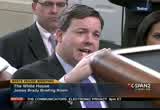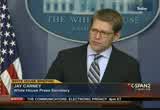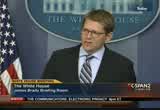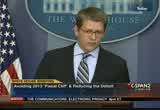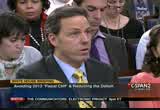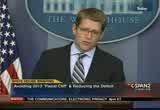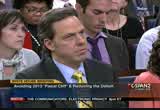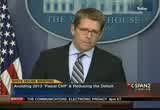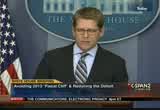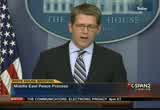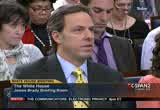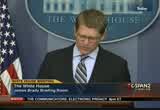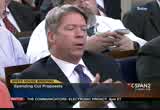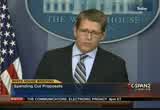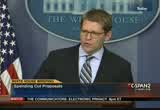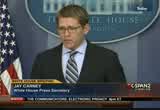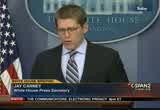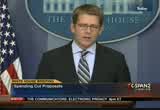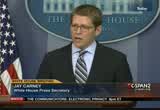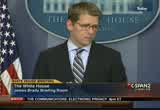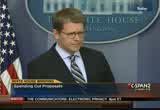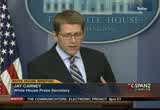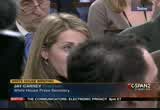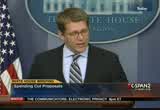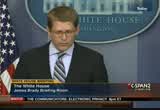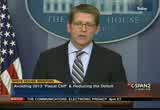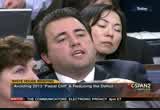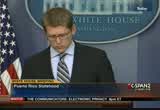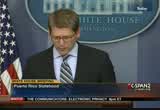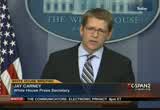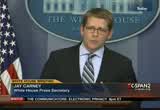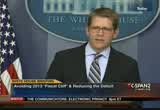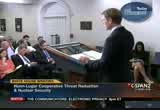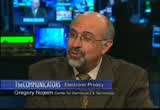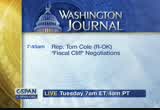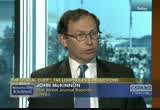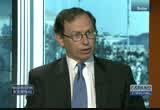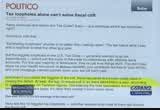tv U.S. Senate CSPAN December 3, 2012 5:00pm-8:00pm EST
5:04 pm
a senator: mr. president? the presiding officer: the senator from maryland. mr. cardin: i ask unanimous consent that the quorum call be dispensed with. the presiding officer: without objection. under the previous order, the senate will proceed to executive session to consider the following nomination which the clerk will report. the clerk: nomination, the judiciary, paul william grimm of maryland to be united states district judge for the district of maryland. mr. cardin: mr. president? the presiding officer: under the previous order, there will be 30 minutes for debate equally divided and controlled in the usual form. mr. cardin: mr. president? the presiding officer: the senator from maryland. mr. cardin: mr. president, i am pleased to join with senator mikulski in recommending to the senate the confirmation of judge paul william grimm of maryland to be a u.s. district judge for the district of maryland. i'm very proud of the process that senator mikulski has instituted for us making recommendations to the president to fill judicial appointments. i believe that under this
5:05 pm
process, we have reached to get the very best to recommend to the president and then to our colleagues for confirmation, and judge grimm clearly falls within this line. the senate judiciary committee favorably reported judge grimm's nomination by voice vote on june 7 of this year. judge grimm was nominated to fill the vacancy in maryland that was created when u.s. district judge benson e.laig took senior status in june. judge grimm brings a wealth of experience to this position. early in his career, he served in the military in the judge advocate corps handling commercial litigation in private practice and served as assistant attorney general of maryland. he also sat as a federal magistrate judge in maryland for 15 years. judge grimm was born in japan and received his undergraduate degree from the university of california in 1973 and graduated from the university of new
5:06 pm
mexico school of law in 1976. judge grimm was admitted to the maryland bar in 1977. he has strong roots, legal experience and community involvement in the state of maryland. judge grimm lives with his family in towson, maryland. judge grimm began his legal career after graduating law school back in maryland as a captain of the united states army judge advocate corps at aberdeen proving grounds in maryland. he worked at the pentagon before heading back to the baltimore region alternating working in private practice and working in the state's attorney general's office, while continuing to serve as an active duty u.s. army j.a.g. corps officer with occasional stints in the pentagon. in 1997, judge grimm was elected a magistrate judge by the judges of the u.s. district court for the district of maryland and in 2006 became the chief u.s. magistrate judge in baltimore. in 2009, chief justice john roberts appointed judge grimm to serve as a member of the advisory committee for the federal rules of civil
5:07 pm
procedure, and in 2010, he was designated as chair of the civil rules committee discovery subcommittee. i mention that because it's evident from the chief judge's appointment that judge grimm is a nationally recognized expert on cutting edge issues of law and technology. he has written numerous authoritative opinions, books and articles on the subject of evidence, civil procedure and trial advocacy. he also continues to inspire the next generation of lawyers by teaching classes at both of our law schools, and on several occasions, professor grimm has been awarded the title of outstanding magistrate faculty member. that's as a magistrate judge, he has been able to find time not only to teach but to be an outstanding professor. he has shown his commitment in so many ways to public service. as a magistrate judge, judge grimm is responsible for handling criminal matters such as issuing search warrants, conducting preliminary criminal proceedings and presiding over
5:08 pm
misdemeanor criminal cases. judge grimm is also responsible for handling civil cases. he has presided over bench and jury trials with the consent of the parties. judge grimm also conducted settlement conferences, resolves discovery disputes and handled other nondepositive matters at the referral of u.s. district judges. judge grimm has estimated in his 15 years as a magistrate judge he has provided over approximately -- presided over approximately 50 civil trials, 150 criminal misdemeanor trials including jury and bench trials. he is well qualified and has the experience necessary to serve on our district court. he received a unanimous rating, a well qualified, highest possible rating for a judicial nominee from the american bar association's standing committee on the federal judiciary. as he previously mentioned, he received a voice vote of confidence from the judiciary committee. i'm absolutely confident that judge grimm possesses the qualifications, temperament and passion for justice that make
5:09 pm
him an outstanding -- make him an outstanding united states district court judge for the district of maryland. i urge my colleagues to vote for his confirmation here on the senate floor. with that, i would yield the floor. mr. grassley: mr. president? the presiding officer: the senator from iowa. mr. grassley: i am going to vote for mr. grimm to be district judge. i know of no organized opposition on my side of the aisle. that doesn't mean that there might not be a few votes against, but i don't know who they are and hopefully it will pass unanimously. i'm going to put a statement in the record on my reasons for voting for mr. grimm. i'm going to spend my time giving some review of the -- of the approval of judges during lame duck sessions of presidential years. today, for only the fourth time
5:10 pm
in over 70 years, we will confirm a federal judge during a lame duck session in a presidential election year. according to the congressional research service, the senate has confirmed judicial nominees during a lame duck session in a presidential election year on only three occasions since 1940. it occurred in 1944, 1980 and 2004. so for those who say that we're treating this president differently, i would say that we have treated him far better than most presidents have been in regard to their judicial nominees. this year, we will have already confirmed 31 district judges and five circuit judges. that meets or exceeds the confirmations for presidential election years in recent memory. this is more confirmations than we did in 2008.
5:11 pm
it exceeds the district confirmations in 2004 and ties the circuit confirmations for that year of 2004. it is the same number of district confirmations in 2000, and it is considerably more than we confirmed in 1996. so for the past five presidential election years, this year stands near the top for judicial confirmations. yet, despite this record and despite the fact that we are about to confirm yet another district court nominee, all we hear from the other side are complaints. i must say, it makes it quite difficult to work cooperatively when, no matter what you do, all you hear are complaints. lately, we have heard the other side arguing that since the president won re-election, we shouldn't have to follow past practices, but rather we should confirm a large number of
5:12 pm
nominations during this lame duck session. the last time a president was re-elected, -- that would be president bush in the year 2004 -- we heard a different tune from the democrats. that year, the other side was in no hurry to confirm president bush's nominees. in fact, only three judicial nominees were confirmed after the november, 2004, election. that year following president bush's re-election, 23 judicial nominees that were pending either on the senate executive calendar or in the judiciary committee were returned to the president when the congress adjourned in december, 2004. recently, one of my colleagues on the other side stated, and i quote -- "from 1980 until this year when a lame duck session followed a presidential election, every single judicial nominee reported with bipartisan
5:13 pm
judicial committee support has been confirmed." end of quote. i suppose this is meant to imply that there is some long record of routine confirmations following a presidential election, but that is simply not the case. let me tell my colleagues what that means. one circuit confirmation in 1980 and three district confirmations in 2004. that's it. from 1980 through 2008, those four nominations represent the entire list. there were no such confirmations in 1984, 1988, 1992, 1996, 2000 or 2008. furthermore, limiting this list to the quote i gave, reported with bipartisan committee support, end of quote, fails to take into account that many judicial nominees in the past
5:14 pm
administration were subjected to a pocket filibuster. that means, of course, that they never had a hearing or opportunity to be reported out of committee. so it is somewhat misleading to suggest the senate routinely confirms nominees during presidential lame duck sessions of congress. again, the last time a president was re-elected, only three of his nominees were confirmed following the election. today we will add to that exclusive list, and the senate has a time agreement for a vote on the second district nominee before we adjourn. this afternoon, we're considering the nomination of paul william grimm to be united states district judge for the district of maryland. with his confirmation, the senate will have confirmed 159 of president obama's nominees to the district of circuit courts. during the last presidential
5:15 pm
election year, -- 2008, that is -- the senate confirmed a total of 28 judges, 24 district and four circuit. this presidential election year, we have exceeded those numbers. we have confirmed five circuit nominees and judge grimm's will be the 32nd district judge confirmed. that is a total of 37 judges this year versus 28 in the last presidential election year. so once again i want to set the record straight and i hope i've done so. republicans have been more than fair to this president and his judicial nominees. i support this nomination and will put the balance of my statement in the record. i suggest -- i suggest the absence of a quorum. the presiding officer: the clerk will call the roll. quorum call:
5:18 pm
5:19 pm
mr. chambliss: i ask unanimous consent igor demensky be allowed floor privileges for the remainder of the consideration of s. 3254. the presiding officer: without objection. mr. chambliss: i suggest the absence of a quorum. the presiding officer: the clerk will call the roll. quorum call: a senator: mr. president? the presiding officer: the senator from maryland. ms. mikulski: good evening, mr. president. i wish to inquire --. the presiding officer: we're in a quorum call, madam. ms. mikulski: i ask that the call of the quorum be vacated. the presiding officer: without objection. ms. mikulski: and i ask to speak on the pending nomination of judge paul grimm on which we will vote on shortly. the presiding officer: without objection. ms. mikulski: thank you very much, mr. president. mr. president, i am so proud to
5:20 pm
be here to support the nomination of judge paul grimm. a stellar marylander and outstanding legal mind and nominated to serve on the district court of maryland. senator cardin and i recommended judge grimm to president obama with the utmost confidence in his abilities, talent, and competence for the job. and the a.b.a. agreed with us and gave him the highest rating of unanimously qualified. i'd like to thank senators reid and mcconnell for breaking the logjam so that we could bring this to everyone's attention and commend senator leahy for the swift movement through the committee process. i take the -- i've had the opportunity to recommend several judicial nominees, and take my advise and consent responsibility very seriously. i have four criteria. my nominee must have absolute integrity, judicial competence and temperament, a commitment
5:21 pm
to core constitutional principles, and i ask for a civic engagement in maryland so they're familiar with the lief and -- life and times of the people they will adjudicate over. i mentioned these standards because often i -- i mention these standards often because i mean it. judge grimm does exactly that. he brings the right hard-working values to the bench and the necessary experience, sharpening his legal skills for many years as a litigator, a judge advocate general lawyer, a j.a.g. officer and indispensable asset to the district court of maryland as a chief magistrate judge. judge grimm knows what it means to be of legal service to the legal froftion and maryland and the country. he is a public servant first and-hour foas. his father was in the military and he started very early
5:22 pm
prosecuting court-martials while attending law school on an rotc scharn. he searched as a -- in the j.a.g. corps for three years beginning at aberdeen proving ground and later at the pentagon. but it didn't end there. he went on to serve as a reserve j.a.g. officer for 22 years, retiring as a decorated lieutenant colonel. his life and resume are a clear display of civic engagement. a member of various bar associations in maryland, professional organizations, and at the same time he was a boy scout leader, and also helped young students in high school learn how to do a mock court. let's go, though, to his being a good lawyer. judge grimm is known as a trailblazer in the maryland community. he's well respected not only for his extentive -- extensive and ear ewe diet writings and teachings but his commitment to the improvement of the practice of law and the administration of
5:23 pm
justice. he spent his entire legal career in maryland and he's absolutely prepared for service on the court and for the court. he's already served 16 years as a magistrate judge in the district court of maryland, and of those six --, of the last six years, he's been the chief magistrate. prior to taking the bench he was 13 years as a litigator in a private practice, handling people priem mayoral civil cases. he was an assistant attorney general for maryland and a prosecutor in baltimore county. also his experience and service are unparalleled. recently he served on the advisory committee for the federal rules of civil procedure since 2009 and later designated as the chair of the discovery subcommittee. he's been honored by the a.b.a., the maryland daily record which is the kind of legal paper in maryland, and he's been twice recognized by
5:24 pm
the university of maryland law school. by every index of what makes a great judge, absolute integrity, judicial temperament, legal experience, well regarded by peers and all who appear before him, i think this is just a nominee that we need to to -- we want to maintain our constitutional imperative of an independent judiciary on which our judges come with the best background and the best values. it is critical that we have judges to be able to do that, and i hope that we -- i hope that my colleagues join me in voting for judge paul grimm. and i also hope that with the other 19 nominees on the calendar, many of whom have been voice voted through the committee, we also confirm those before this lame duck. mr. president, i have completed my presentation on the
5:25 pm
5:32 pm
the presiding officer: the senator from connecticut. mr. lieberman: i thank my friend who is the occupy pant of the chair. -- occupant of the chair. i ask unanimous consent that further proceedings of the under the quorum call be dispensed with. the presiding officer: without objection. mr. lieberman: i yield back all time on this side. a senator: i yield back all time on this side. the presiding officer: all time has expired. the question is on the nomination. a senator: ask the yeas and nays. the presiding officer: is there a sufficient second? there appears to be a sufficient
6:03 pm
there any members wishing to vote or change their vote? if not, the ayes have 92, the nays 1. confirmation is confirmed. a senator: mr. president? the presiding officer: the chairman. the majority leader. mr. reid: i ask unanimous consent that not withstanding -- the presiding officer: order in the senate, please. order in the senate. mr. reid: i ask unanimous consent that not withstanding the previous order with respect to treaty document 112-7, the vote on ratification occur at 2:15, tuesday, tomorrow, december 4, with all the provisions of the previous order remaining in effect. what this does, mr. president, is have the vote at noon on the disability treaty, would have it after our caucus. the presiding officer: any objection? a senator: mr. president, i object. the presiding officer: under the previous order, the motion to reconsider is considered made and laid on the table. the president will be immediately notified of the senate's action and the senate
6:04 pm
will resume legislative session. mr. levin: mr. president? the presiding officer: the senator from michigan. order in the senate, please. the senator from michigan. mr. levin: we hope that cloture will be voted now. we've disposed of 119 amendments to this bill. i talked to the majority leader. and if we do vote cloture tonight, which of course senator mccain and i hope we will, we're still going to try to clear some additional amendments using the same process we've used up to now. and we would hope that we could clear some additional amendments right up to the time of final passage. we've asked the majority leader, hopefully we can get to final passage tomorrow at some point. the clerk: cloture motion, we the undersigned senators in accordance with the provisions of rule 22 hereby move to bring to a close debate on s. 3254 for
6:05 pm
fiscal year 2013 for military activities of the department of defense and so forth and for other purposes. signed by 18 senators. the presiding officer: by unanimous consent, the mandatory quorum has been waived. the question is is it the sense of the senate that the debate on senate bill 3254, an original bill to authorize appropriations for fiscal year 2013 for military activities of the department of defense for military construction, and for defense activities of the department of energy, to prescribe military personnel strengths for such fiscal year, and for other purposes, shall be brought to a close? the yeas and nays are mandatory under the rule. the clerk will call the roll. vote:
6:25 pm
6:26 pm
6:27 pm
the presiding officer: the senator from michigan. mr. levin: madam president, i call up a list of 13 amendments which have been cleared by myself and senator mccain -- coats amendment number 2923 as modified by changes at the desk, webb amendment numbered 2943, casey amendment numbered 2997 as modified by changes at the desk, cardin amendment numbered 3023, wicker amendment numbered 3121 as modified by changes at the desk, portman amendment numbered 3142, webb amendment numbered 3144, corker amendment numbered 3172 as modified by changes at the desk, lieberman amendment numbered 3276, lautenberg amendment numbered 3298, blunt amendment numbered 3278 as modified by changes at the desk,
6:28 pm
rockefeller amendment numbered 2996, reid amendment of nevada, numbered 3047 as modified by changes at the desk. i ask consent further, madam president, that the senate consider these amendments en bloc, the amendments be agreed to and the motion to reconsider be laid upon the table. the presiding officer: without objection, so ordered. mr. levin: i move to reconsider -- i think we did that already, so i yield the floor. i thank all of our colleagues for their cooperation. we will continue until vote on final package, which we expect tomorrow, to continue to try to clear some additional amendments. mr. mccain: madam president? the presiding officer: the senator from arizona. mr. mccain: we continue after a few hours pause today because of the objection of one senator by long distance, but i am very confident with the cooperation
6:29 pm
of our colleagues we can finish this amendment tomorrow, and i hope that we can have the cooperation of all of our colleagues. we have tried very hard to make sure that every amendment that's that's -- that consideration is brought up. we have now approved of well over 100 amendments, and i think that most members have had at least one amendment approved so far. i hope that we can continue the cooperation and we can finish this bill tomorrow. mr. mccain: i note the absence of a quorum. the presiding officer: the clerk will call the roll.
6:30 pm
quorum call: quorum call: the presiding officer: the presiding officer: the senator from arizona. mr. mccain: i ask that further proceedings under the quorum call be suspended. the presiding officer: without objection. mr. mccain: tomorrow a vote is scheduled on the treaty on the persons with rights with disabilities. i'd like to take a few minutes about the upcoming vote. first i think we ought to understand this is not anybody's treaty, it's not president obama's treaty, it's not john kerry's treaty, it's not even bob dole's treaty, although he certainly is a person who has been deeply involved. the vote on the treaty is the right thing to do on its merits. i think that it's important to
6:31 pm
note that every major veterans' group -- madam president, i ask that the list of the veterans' groups in support be included in the record at this time. the presiding officer: without objection. mr. mccain: i've not forgotten that 36 republicans signed a letter opposing consideration of any treaty during the lame duck, but there's no reason why we shouldn't have a vote on this. the letter says that they would oppose consideration, but we did have the motion to proceed. some may be worried about passing a treaty in a lame-duck session. the argument has no basis in the constitution or the senate practice. since the 1970's alone the senate has approved treaties
6:32 pm
during lame-duck sessions a total of 19 times. there's nothing special or different about lame-duck sessions. i'd like to address a few of the misconceptions about the treaty that i keep hearing. it's true that the treaty establishes a committee, but that committee has exceedingly limited powers. it can review reports submitted by countries on the steps they have taken to implement the convention and can make nonbinding recommendations for additional steps, and that's it. nothing else. it can't require our federal or state governments or courts to take any action. there's no threat to the united states or our sovereignty from the committee. with respect to abortion, this is a disabilities treaty, and has nothing to do with abortion and doesn't change our law on abortion in any way. trying to turn this into an abortion debate is wrong on
6:33 pm
substance and bad politics. as to the united nations, i've heard people people say that ratifying the convention would take decisions out of parents' hands and let the u.n. or the federal government decide what's best for our children and that's just wrong. the treaty doesn't give the federal government or any state government new powers. with regard to children with disabilities and the treaty cannot be used as a basis for a lawsuit in state or federal court. former attorney general dick thornburgh made this crystal clear in his testimony before the senate foreign relations committee and in every conversation i've had with him. i would support the treaty if -- i wouldn't support the treaty if it were any other way. let's take a step back and look how this looks if america jeects this treaty. china has joined, russia has joined. we are the country that set the standards on rights for the --
6:34 pm
of the disabled. we want everybody to play by international rules. we lose credibility if we turn around and refuse to participate in a treaty that merely asks other nations to live up to our standards, our rules. i'd like to point out that we got a letter from the blind chinese dissident, guen chon chang talking about the plight of the disabled around the world and what a strong message it would send if the united states ratified this treaty. there's no reason why we can't say that we lived up to our obligations. we need to step up and do the right thing for bob dole and our veterans throughout the world. i'd like to enter into the record at this time a letter from the very well known
6:35 pm
internationally blind chinese dissident who recently left china miraculously and thank god for the efforts of our state department and our government. the presiding officer: without objection. mr. mccain: i quote one quote that he says in his letter. when the united states enacted the americans with disabilities act over 20 years ago, the idea of true equality for people with disabilities became a reality. many nations have followed in america's footsteps and now coming together under the shared principles of equality, respect, and dignity for people with disabilities, as obtained -- as entailed in the crpd. the united states was which was instrumental in negotiating this treat writei can continue to advance its issues and principles of practical accessibility for its citizens
6:36 pm
and all people around the world and by ratifying the treaty so take its rightful place of leadership in the arena of human rights. and he concludes and he says as i continue my studies in the united states, it's a great pleasure to now learn firsthand how the united states developed such a comprehensive and strong system of protection for its citizens with disabilities. i am so hopeful that you will support ratification and allow others to benefit from these triumphs. thank you for your leadership. i couldn't say it with any more passion nor any more authority than the gentleman who just wrote this letter. madam president, i suggest the absence of a quorum. the presiding officer: the clerk will call the roll. quorum call:
6:45 pm
6:46 pm
the presiding officer: without objection. mr. brown: i ask unanimous consent to speak as if in morning business. the presiding officer: without objection. browp brown i rise t member rigt -- as a result of a brants's comument to working together, an unused farm field will soon cultivate the next area of brian area baseball plashings supporting sportsmanship. this new indoor field in williams' county honors the lightest of a young ohioan. david betz would have been 26 on december 10 this year, the day this field will open for members of the entire bryan community. david was the beloved son of john and joy betz. he died in a march 2007 motor 13 coach accident along with other members of the bluffton university baseball team in atlanta, georgia, on the way to spring training. he was a graduate of bryan high school.
6:47 pm
after this tragedy, john and joy betz married a promise that their son's death and the loss of four other players and the bus driver and his wife would not be in vain. out of the tragedy and other trag dis like it, senator hutchison, a republican from texas, rand i introduced the motorcoach enhanced safety act to help prevent the loss of life on our nation's roadways. president obama signed the law earlier this year to ensure that tour buses are equipped with seat belts and are driven by drivers who are better trained. the safety bill was written with support of the betz fathers the bryan community and national community of people who have lost loved ones in motorcoach crashes. some five years later this close-knit northwest ohio community also has a tangible monument in honor -- in memory of one of their sons. may the david betz double play diamond serve as a remembrance to this wonderful young man and
6:48 pm
help this community continue to heal and move forward. i thank the president. madam president, i'd like to ask that the following remarks be put in a different place in the record. the presiding officer: without objection. mr. brown: thank you, madam president. i rise to address an issue that concerns families and children and veterans and so many people in north carolina and ohio and around the country and around the world. i rise for millions of americans, family members, friends, loved ones, and colleagues who experience some level of disability. people living with disabilities have long been isolated, pushed to the margins of society. an example of that is america's deaf community. the deaf community strongly supports this treaty. many students at gallaudet university, a university founded by an act of congress in 1864, the charter synd by president lincoln so that people with disabilities are capable of doing so much more to enrich our culture.
6:49 pm
gallaudet -- i sit on the board of one -- you the only senator's senator in this body who sits on the board of gallaudet. i sit on the board of this great yiewrveghts the only one of its kind in the world. it's close to 150 years old. we know how important it is. many students at gallaudet from other countries want to be able to go home to the same kinds of accessibility they've experienced while studying in the united states. but they don't have it in far too many places. a recent state department report found that people with disabilities remain one of the groups most at risk of being trafficked. that should spur all of us to do what we can to ensure that every human being has the chance to reach her or his god-given potential. yet too many people with disabilities around the world and americans abroad lack this protection. this includes being forced into low-wage employment, being forced to beg for meals, being less likely to have access to
6:50 pm
transportation and the justice system in whatever country they happen to be in. in america we fought to pass the americans with disabilities act and we lead the world in services in accessibility for disabled people. we passed it because democracy is only as vibrant as it is open to the participation of all citizens. that's why i was proud to cosponsor critical amendments to the a. dea., the americans with ta disabilities act to make the definition of "disability" more inclusive. we taught for the a.d.a. amendments act of 2008 because access to a good-paying job, to public transportation, to public accommodation should be universal. now, some detractors say, well, americans are taken care of here at home. why should we worry about discrimination that disabled people in other countries might suffer? dr. king wrote in a letter from a birmingham jail that injustice anywhere is a threat to justice
6:51 pm
everywhere. he explained that we're caught in an inhescapable network of mutuality tied in a single garment of destiny. whatever affects one directly affects all indirectly. if we are to maintain our global leadership, if we believe in american exception aim, if we are to strengthen our moral leadership, we must ratify treaty 112-7 in support of the rights of persons with disabilities. this isn't a liberal or conservative issue. it is not a republican or a democratic issue. this is a cause for people who fight for what's right. that's why some 300 organizations support ratification, including the leadership conference on civil and human rights, the wounded warrior project, the hindu american foundation the islamic center of -- society of north america, the jewish federations of america, the national catholic social justice lobby, and the veterans of foreign wars. let me share a couple of
6:52 pm
letters. bernard from franklin county in my state wrote, "i'm concerned about recent grumblings about former senator santorum and others. i was a lot of regard for the a.d.a. and a a wareness of discrimination against people with disabilities. when will the senate take up this u.n. resolution? what can i do to convince oppositional senators that this is an important and necessary resolution for people with disabilities, especially our nation's veterans? well, bernard, my colleagues on the other side of the aisle -- nor mccain, former majority leader bob dole, both of whom served our country honorably in the armed forces, and 21 veterans organizations agree with you. this should be an opportunity for all americans to come together and show the world we're committed to ensuring the basic human dignity of every
6:53 pm
human being. an advocate for people with disabilities, deborah kindribbing of cincinnati wrote that supporting the u.n. convention on the rights of persons with disabilities is -- quote -- "the good, old fashioned right thing to do." she's absolutely right. the crpd is an antidiscrimination treaty, a human rights issue, it embraces the valve our own americans with disabilities act. it will not affect u.s. law. it does not infringe upon u.s. sovereignty. ratifying this treaty does allow us to reassert our leadership globally on disability rights. it will give us a seat at the table as parties to the convention grapple with how best to implement it. this treaty is important for americans with disabilities, including soldiers and veterans when they work abroad or study abroad or simply travel abroad. that's why i urge my colleagues to join in ratifying this treaty and to stand up for people with
6:54 pm
disabilities in ohio, throughout america, and around the world. i thank the president, and i note the example of a quorum. -- note the absence of a quorum. the presiding officer: the clerk will call the roll. quorum call: the presiding officer: the senator from ohio. mr. brown: i ask unanimous consent to dispense with the quorum call. the presiding officer: without objection. mr. brown: i ask that the senate proceed to a period of machine morning business with senators permitted to peek for
6:55 pm
up to ten minutes each. fer if woiks u. mr. brown: i ask that the senate proceed to executive session to consider the following nominations: calendar number 921, 922, 923, 924, 925, 926, 927, 928, 929, 30, and 31. and all nominations be placed on the secretary's desk in the army and navy, that the nominations be confirmed en bloc, the motion to reconsider be laid on the table, with no intervening action or debate, no further motions be in order to any of the nominations, that any related statements be printed in the record, that the president be immediately notified of the senate's action, and the senate then resume legislative session. the presiding officer: without objection. mr. brown: i understand there is a bill at the death i ask for its first reading. the presiding officer: the clerk will read the title for the first time. the clerk: h.r. 6429, an act to amend the immigration and nationality act to promote innovation, investment, and research in the united states to eliminate the diversity
6:56 pm
immigrant program and for other purposes. mr. brown: i ask for its second reading in order to place the bill on the calendar. i object to my own q. the presiding officer: objection having been heard, the bill will be read for a second time on the next legislative day. mr. brown: i ask unanimous consent when the senate completes its business today, it adjourn until 10:00 a.m. on tuesday, december 4. following the prayer and pledge, the journal of proceedings be approved to date, the morning hour be deemed expired, the time for the two leaders to be reserved for their use later in the day, the national recess following the vote in relation to the disabilities treaty until 2:15 p.m. a for the weekly caucus meetings. all time in executive session and recess count towards the national defense authorization act. the presiding officer: without objection. mr. brown: first vote will be
6:57 pm
6:59 pm
>> tuesdays, thank you gates testifies in front of the house transportation committee on the hurricane sandy response and recovery. we are learning what lessons can be learned from it. see his remarks at 10:00 a.m. eastern on c-span3. wednesday, more from mr. craig fugate eight. abel testified in response and recovery of the storm, and this time, they will be in front of the senate appropriations committee. that hearing is live on wednesday at 10:00 a.m. eastern, also on c-span3.
7:00 pm
>> c-span, created by america's cable company since 1979 come across you as a public service by your television provider. >> next we have a press release with jay carney. he said u.s. officials are closely monitoring the situation. he also talked about the fiscal cliff negotiations and peace in the middle east. >> is everyone okay with that? [inaudible conversations] [laughter]
7:01 pm
we are talking about what extent a middle-class tax breaks for me to middle-class families. today at 2:00 p.m., people can ask the president questions on twitter with the hash tag my 2k. after that, this come in this afternoon from the president has a bilateral meeting with the prime minister of bulgaria and this is an important relationship with bulgaria. the president will deliver a speech about 4:00 p.m. commemorating the 20th anniversary of the threat reduction program, which as you know, was authored by richard
7:02 pm
lugar. it has resulted in a regime that allows us to achieve our the president's highest priorities, and that is to secure safety around the world. it is important have to remember that when it comes to these kinds of objectives, democrats and republicans, we can come together and see very important things come and the president looks forward to this.
7:03 pm
we also want you extend our congratulations to the duke and duchess of cameras that they are expecting their first child. >> i haven't had that conversation with them. in another they feel that having a child is one of the most wonderful parts of their life. i'm sure that will be the same for the duke and duchess of kent -- can bridge with akamai will take your questions. >> [inaudible question] does the u.s. consider the security situation serious and it is deteriorating further? >> we closely monitor, and we continue to closely monitor and
7:04 pm
for the material. the assad regime, we have been increasingly concerned having non-escalation of violence through conventional means and it might be considering the use of chemical weapons and as the president has said, any use or proliferation of chemical weapons by the syrian regime would cross a red line for the united states. the regime must know the world is watching. and that they will be held accountable by the united states and international community if they use chemical weapons or fail to meet obligations to secure them. we continue to consult actively with syria's neighbors, our friends in the international community to } our common concerns about the security of these weapons and the syrian government to.
7:05 pm
>> we believe that they are part of the saudi regime. the regime has lost all legitimacy to lead syria and we are concerned about the chemical weapons stockpile, which have increased. >> is the type of movement that we are seeing right seeing right now, and as i crossed the red line? >> i think the president makes clear that the use of weapons was a red line. we are monitoring the situation closely and monitoring the regime and the chemical weapons stockpile. i am not going to get into intelligence matters, but the
7:06 pm
regime's grip on power is losing with putting down the opposition with conventional means. we have an increased concern about the possibility of the regime taking the desperate act of using chemical weapons. >> that you cannot say that what we are seeing right now does not cross the red line? >> again, i think we are talking about the use of chemical weapons. >> i think you are hearing from me about our increased concern. the fact that we are consulting with our allies and national partners from as well as the opposition about this. there is no doubt that we have an increased concern about this. that is an intelligence matter, but we do have an increased
7:07 pm
concern. >> what action with the u.s. take if they cross that redline? >> i would not want to speculate, but we think it is important and it is the responsible thing to do, and we are also actively consulting the opposition. but i would not want to speculate about what actually might occur. >> contingency planning of all kinds are planned. >> [inaudible question] several countries and israel's ambassadors -- are they taking to that plan? are they taking any further steps? >> we reiterate our long-standing and we oppose all
7:08 pm
unilateral actions, including settlement activity and housing construction as they complicate efforts to resume direct bilateral negotiations and risk prejudging the outcome of those negotiations, and this includes building in this area. we have made clear to the israeli government that such actions are contrary including housing construction in east jerusalem and they play a role and urge them to exercise restraint as these actions are counterproductive and make it harder to presume the right negotiations as a two state solution. >> how speaker john boehner said right now, we are nowhere in terms of the fiscal cliff
7:09 pm
negotiation. as the president agree with that assessment? >> no, he doesn't. i think aesop secretary geithner over the weekend. another sunday shows. fairly clearly expressing the president's position to talk about the proposal that the president has pafford and express our belief that there has been progress in that we can achieve a bipartisan agreement. the obstacle remains, at this point, the refusal to acknowledge by republican leaders that there is no deal that achieve the kind of balance necessary without raising on the top 2% of americans, and we look forward to the presentation by republican leaders and their id ideas for spending cuts come as you know.
7:10 pm
as you know, secretary geithner has pafford a proposal that includes $600 billion in detailed spending cuts in health care and other entitlement programs, and that comes on top of over a trillion dollars in spending cuts as part of the budget control act. and it is contending with our proposals for how to achieve the kinds of revenue from the wealthiest americans to help the economy grow and achieve deficit reduction and this puts us on a path towards a better economy. >> [inaudible question] what will he do at this moment? >> i would simply redirect that question to the republican leaders, who to this day, have not put forward any proposal on
7:11 pm
how they would achieve revenues and address the issue on the top 2%. there is no other way to do it, there is no other mathematically sound way to do it. making vague promises about achieving revenue through capping deductions were closing loopholes, it simply doesn't add up to a serious proposal. we haven't heard which deductions they would cap or which loopholes they were close. what is true is that other proposals that have been put forward include attempts to raise revenue only through closing loopholes and limited deductions can only achieve this if the middle class gets stuck with the bill. or if you have a proposal that is wildly limply unfeasible because it suggests that we would wipe out charitable deductions.
7:12 pm
it is simply impossible and getting something from congress enact [inaudible question] they have offered to sit down with the u.s. and talk about this, even if the campaign is over, the president getting his second term, is this something that the administration is considering right now? >> the president is following this with concern, and he urges the release. the cuban government should release alan gross and he will begin his unjustified prison time by cuban authorities were simply facilitating communications between cuba's jewish community and the rest of the world. he's a 63-year-old husband and father and dedicated
7:13 pm
professional with experience in more than 50 countries. since he's been in prison, he has suffered from arthritis and lost 100 pounds and his family is anxious to evaluate whether he is receiving appropriate medical treatment. something that will be determined by having a doctor at his own choosing again. we ask them to grant his request to travel to the united states to visit his mother, he is gravely ill. >> [inaudible question] >> we are asking the cuban government to release him for the reasons i just enumerated. this is a humanitarian issue.
7:14 pm
it is essential that he be released for health reasons. he should be allowed to visit his gravely ill mother. >> or about $1.65 in spending cuts and say on top of those from 2011. republicans point out that you put about you spending on the table. during the campaign, a balanced approach was $2.5 in spending cuts. the latest balanced approach, what is that split for this plan? >> is absolutely the case of the president put forward to the super committee. it is roughly the ratio they are talking about and choose the target of $4 trillion in deficit
7:15 pm
reduction. it is necessary over 10 years to put us on a standard path. it is also the case, and the president talked about this repeatedly, we need to make the kinds of investments that will help our economy grow and help it to create jobs. we have action to improve the infrastructure to put people to work rebuilding our roads and bridges and highways and ports and airports. that is essential to long-term economic growth. they are paid for and they are vital for that balance that we talked about all along.
7:16 pm
again, we have not seen from republicans, as we understand it, they don't agree with everything the president has put on the table, but we have not seen alternatives. they have spoken about the need for revenue, and that acknowledgment is well put. that's far from the republican leaders have been adamant that they do not believe rates are to go up on the top 2% wealthiest americans. the american people overwhelmingly disagree. what the president believes is that you cannot achieve the kind of revenue that are necessary for that balanced approach. through any other means. so rates have to rise. the best way to get from here to there. >> the rates need to rise, there is one scenario that the republicans face, they say they will extend middle-class tax rates that the president has been demanding.
7:17 pm
and that would suggest that the bush tax cuts for the rich would love to see said. and it suggests that they would leave the debt ceiling until at least january. is that acceptable? essentially, do what you want with the middle-class tax cuts and feel of the rest of us in january. >> i will say two things. one thing is i will not negotiate a the specifics at an end of the year deal. but i will reiterate an echo what secretary geithner said over the weekend, which it is entirely unacceptable to have a repeat performance with the american people watched with horror in the summer of 2011. the willingness by a minority of capitol hill to hold the american economy hostage and threatened to call on the american economy area therefore, default on the savings and investments of you american
7:18 pm
people in the name of tax cuts for the wealthy. it is just not acceptable. it is just bad policy. but the president believes we ought to do, as the secretary geithner spelled out over the weekend, is adopt the proposal at the budget control act that was put forward by senator mcconnell. it enables the debt ceiling to be raised appropriately so the united states pays its bills, and it allows congress to voice its opinion, but it makes sure that we do not have the threat of default hanging over us periodically, as if we were not the greatest and strongest economy in the world. that's just not the right way to do business. >> this could come as soon as this week. is that possible? >> yes, the president will make
7:19 pm
personal announcements after he has made personnel decisions when he believes it is appropriate. there is a great deal of speculation about that and i can promise you that many decisions have been made and that you will hear from him when he believes he is ready to make any such announcements. >> became -- [inaudible question] >> i think most people would acknowledge that the people support that. he also believes that it's the right thing to do as a matter of economic policy. we know from independent economists that tax cuts for middle-class americans, indicates of the legislation,
7:20 pm
they would like to see tax cuts for 90% of american taxpayers -- that is vastly more beneficial for economic growth than giving tax cuts to the wealthy. we also cannot afford tax cuts for the $950 billion over 10 years that we should not be spending in order to provide tax cuts on those. when it comes to balance, the president believes it is the right thing and it's the only mathematically sound way to achieve balance in the deficit reduction package and the point i've been trying to make is that he was very clear about this. but it should not be a surprise to republican leaders. >> this officer that the president made to house
7:21 pm
republicans, he is questioning more than that. repeatedly during the year about his proposal, he has been trying in an odd page document -- 70 odd pages at the podium last week, he was presented with a super committee appropriation. the deficit reduction has long been his position and it has been explicitly his position. we talked about it in the aftermath of the election. he did not suggest that he somehow added to his proposal -- >> what i am saying is that we didn't campaign on limiting the deductions for wealthier americans or limiting charity deductions for wealthier americans. those are not items that we talked about on the campaign trail. >> we talked explicitly and
7:22 pm
probably about this issue. and it included $1.6 trillion in revenue from the wealthiest. we were very explicit about this here in washington as we were engaged with congress and probably to that year, those proposals included -- we have talked about capping deductions. >> he did and he was certainly reporting this. it is something that is for the top 2%. something he had been explicit about for more than a year now since september 2011.
7:23 pm
>> [inaudible question] >> i would say one of the reasons is that we need to continue to grow the economy. and he has always believed that deficit reduction is our goal on the side. we need to achieve that in a way that does throw this backward and the reason that people are so concerned about the fiscal cliff prospect is the commendation of tax increases and spending cuts across the board and how they would have negative impacts. so we need to do it in a smart way. even as we find savings, we need to make targeted investments and we need to do things that help
7:24 pm
our economy and the long-term. >> [inaudible question] >> it is not specifically designed for that. it is the president's broader approach this. significant savings need to be where we can get them, a trillion plus in the budget control act, an additional $600 billion in savings but ford is part of the proposal. and also revenues from the wealthiest 2%, coupled to make the economy grow. it is stronger growth, stronger job creation. as a principle, deficit reduction done well and done right is positive for the
7:25 pm
economy. >> on the subject of israel, in the last few weeks, you asked about -- [inaudible] [inaudible question] the u.s. has been very steadfast to stand by israel. i'm wondering in light of that, are there any statements that have gone out in regards to what the president has done to express this and what the israelis are doing right now? they are being described as punitive actions.
7:26 pm
>> i don't have any conversations with the president as far as that goes, but i want to be clear that we oppose unilateral action that makes a return to bilateral negotiations. we oppose, oppose, as we won't have, israeli settlement activity and we believe it is counterproductive to the goal here and should be the goal. >> [inaudible question] >> there was one thing about arriving here when the announcement was made. >> i don't have information to give you regarding not. >> [inaudible question]
7:27 pm
>> when the vice president arrived in israel? >> i can just tell you that i don't have any specific information about those communications between the israeli government and this administration. i don't think we can be clear with unilateral actions that make a return to bilateral activity. [inaudible] >> what is the president's awareness and concern about an appetite for intervening in los angeles and long beach?
7:28 pm
>> i can just tell you that we, we continue to monitor the situation in los angeles and closely urged the parties to continue to work at the negotiating table to get a deal done as quickly as possible. >> i don't have any additional insights about the president on this as far as monitoring the situation. we urge each side and all parties to continue negotiations. >> this has consequences in the immediate region, possibly throughout the entire u.s. economy. was that the president only concerned? >> is concerned. he is concerned. they're at the negotiating table. they want to reach a deal as quickly as possible. >> [inaudible question] there were far more things put
7:29 pm
on the table as requests on when insurance payroll tax would be conceptualized and dealing with medicare premium reimbursement issues -- what is the one singular issue that you're focusing on as far as the top 2%? [talking over each other] >> what is remarkable about this, and this was said on the sunday shows, in this day, in 2012, how-to people are aware of what was a issue that happened in september. the unemployment rate, while it has come down, is still higher when george w. bush extended it. ..
7:30 pm
7:31 pm
it's mathematically impossible to receive targets necessary or balance in a way that only closes loopholes and tax deductions. both economically -- >> that's been your earlier point. >> depending on the proposal you're talking about. it is either possible to do it if you stick it to them about class and race taxes on the middle class you can tax the wealthiest americans from having to contribute more, or you do it in a way that would go after things like charitable deduction for the home mortgage plan in a way that is not either economically sounder political feasible on capitol hill. so we hope for a specificity from republicans. if they need something different, if their ideas are different from ours, we cannot guess what they are. they need to tell us.
7:32 pm
we look forward to the time when they are specific with ideas in the way we have been. we understand they don't like our plan in its entirety. the president has made clear he won't get everything that he wants. he brings to this very specific principles about balance. he said or he will not under any circumstances signed an extension of tax cuts for the top 2%. he's made very clear that he will sign tomorrow if a few dozen or so house republicans, first of the leaders of the republican in the house at the start of the senate bill to extend tax cuts for 90% of the american people. however many republicans it takes, probably not that many. let that pass. that addresses the fiscal cliff and says to the american people we can take action on things we agree on. it's good for everybody, the economy, fiscal cliff and it would set a tone here in washington that we can get
7:33 pm
something done when we work together cooperatively. so we've been explicit, specific. we look forward to specificity from republicans. >> there are now countdown clocks -- [inaudible] those of us who have been lucky enough to study the legislative body we have an idea of how things go. there's more and more lawmakers who look at it and say it's december 15th. if you have an agreement and have the time necessary for it to be read, digest it, debated before christmas. the president shares that timeline. it's not december 1st. it's something of a practical matter much earlier than that. is that is that in any way create a sense of urgency? >> the sooner the better that we receive specificity from republicans about what it is they would do on revenues, for
7:34 pm
example, what it is they want on spending cuts, for example. we will be able to move forward and we look forward to doing that. in terms of the congressional club, i too enjoyed congress when i had the opportunity and many which are talking about. we're not going to take it the congressional leader calendar. it is certainly the case we hope and expect republicans will be more specific about what it is beyond not liking the president's proposals, what it is they would do alternatively to achieve the deficit reduction and resolution of the fiscal cliff that the president's plan would do. i believe secretary kiker expressed over the weekend we can accomplish this. i really believe if republicans were to acknowledge and do so specificity that rates are going up on the wealthiest americans.
7:35 pm
i'm talking about getting two -- i'm talking about moving the ball forward in terms of progress in reaching a deal, but that is an obstacle that once overcome would allow us to move more quick way towards the kind of compromise. what was now in the secretary kiker spoke about in which he and neighborhoods brought to their meeting on capitol hill with a framework for a purpose trademark for how to achieve a two-stage process towards a resolution. so there is a means to get there. what we need from republicans, what we need to hear and see it's pretty clear. as of now, the only party to these negotiations put forward on anything specific when it comes to broad-based deficit reduction is the president.
7:36 pm
>> he said the administration laid out the highly detailed specific or postal including spending cuts. did the administration's proposal detail how you get to $400 billion on medicare and other entitlements? >> secretary kiker said over the weekend he talked about the broader spending cuts, including 600 billion also spoke about asking high wage earners who are medicare beneficiaries to pay my premiums come a little more in premiums and he talked about other specifics. i refer you to a document that is coming up 14 and 50 months. we have been specific about what the president believes is the right course of action. we look forward to republicans during the same period >> this proposal for brand on entitlement spending, or is the
7:37 pm
administration outlining a framework and proposed cuts to be resolved on the line? >> i would refer you to a secretary geithener spoke in detail about this. we do have specific or postal spirit >> when it came to entitlements he said there were principles. >> there are specifics in the proposals, far more from the other side. in the house republican budget, we saw nothing like the specificity. we saw undocumented savings come unspecified savings over 10 years, after which medicare would end as we know it and additional savings at how pay for tax cuts. the presidentpurposely planned health care entitlements in the first 10 years exceed the savings put forward by the paul simpson commission. the norstar if you wrote this process. i refer you to the document for more details. we have been specific. we understand republicans
7:38 pm
won't -- maybe they want different kinds of cuts. maybe they want additional cuts. the president has made clear he will entertain others' ideas. we need to see what they are. we can't pass on their behalf what republicans want out of this process. they need to put forward ideas as we put forward ours. >> they feel the administration didn't be specific about entitlement changes, but very specific for tax reform. and you heard what they said. >> i heard what she said, but look at the proposals. we understand they may want different ones. let's be specific about the fact we put forward substantial savings and health care entitlements as were his other entitlement programs.
7:39 pm
>> over the weekend, secretary geithener in the op-ed "wall street journal." >> i don't know that he rejected it. we know what our position is. what i would notice the idea senator mcconnell talked about the amount to half of the savings documented in the president's proposal. the president is willing to entertain others' ideas. but we haven't seen anything yet from republicans that is credible or specific. on the revenue side we see nothing at all because sometimes we get into the debate and crossfire about who is the planet who doesn't and he's showing there is and who's not. they say we passed a budget. let's remember the house republican budget contains zero and revenues so that's not a plausible. revenues have to come from those who can afford them. now we need to do that
7:40 pm
acknowledgment further along down the road to include specificity about how, what loopholes, what deductions and what they envisions. we've been very clear about what we propose. rates should rise adequate era and we've been very specific about capping deductions for wealthy owners and the closing loopholes. so what do the republicans have two show us on that? >> attending this holiday reception. does the president have a plan to discuss issues? >> on the schedule of the president's conversation. he looks forward to the event tonight, but i don't have anything specific. it is true that every member of congress has been invited and he looks forward to the event. >> this president clinton have any remarks were suggestions to president obama through their golf game on the fiscal cliff?
7:41 pm
>> for reasons that would be apparent to anybody who's seen me sitting at golf club i was not there and therefore do not know. [inaudible] >> and a president obama enjoyed the session, but beyond that i don't have anything else for you. [inaudible] >> can you give us more detail about who will be here, how many end the dialog does not already part of the conversation? >> the president looks forward to the meeting. i think we will have details on that later this evening. i don't have a list for you. >> in concept, talk about what experience governors have, what is hoping to hear every day. >> governors have a lot at stake in this process.
7:42 pm
they've been interesting seeing washington get its fiscal house in order. they see action to ensure that the economy continues to grow. governors broadly speaking having an interest in washington making wise investments and rebuilding our infrastructure. they obviously have a stake in our health care entitlement programs including of course medicaid. and what governors house in common with the president of the united states is their chief executives. they run things and they're very practical and pragmatic about it by and large. you know, that is sometimes a distinction between governors and lawmakers on capitol hill. i can't speak for every single one of them, that they tend to want pragmatic solutions to these fiscal challenges of the president looks forward to having a conversation with those governors.
7:43 pm
[inaudible] >> in some other states have not yet been all the deadlines with regard to the health care exchanges, will that be on the table as part of the political discussions tomorrow? >> i suppose it could be discussed. i don't have an agenda beyond what we talked about your readout to you. >> on a different topic, the president has an honorary degree from the university of notre dame. will he be rooting for his honorary alma mater on january 7? >> i don't know. i will have to ask him. but it was a heckuva game between alabama and georgia. >> thank you. as you know, this last time around, 61% of puerto ricans voted for statehood. is the president going to be helping us, trying to make it
7:44 pm
easier, trying to make it faster? what is he going to do for us? >> the outcome is a little less clear than that because of the process itself. what i can to use the people of puerto rico have made it clear they want a resolution to the issue of the island's political status consistent with the recommendations of the task force report congress should now study the results closely and provide the people of puerto rico with a clear path forward that lays out the means by which puerto ricans themselves can determine their own status. this administration as it is committed to the question of political status as a matter of self determination for the people of puerto rico and the task force on puerto rico's status to work with congress to address this important issue. in addition to the question of status, the task force continues to work with congress. the people of puerto rico address the concerns of the 4 million u.s. citizens that call puerto rico home to implementing a 2011 report's
7:45 pm
recommendations to promote job creation and economic development, education, health care, clean energy and to improve security. april. >> what are your thoughts about elijah cummings who has to be good friends at the president saying that no deal [inaudible] >> well come i didn't see the specific comments. the president has principles here he intends to stick to, which is that he will not sign an extension of the bush era tax cuts for the top 2%. full stop, he will not sign a bill that extends those tax rates for the top 2%. we can't afford it. it's not a wise economic policy. it's not wise fiscal policy and it would defeat the principle of balance he has embraced so
7:46 pm
clearly throughout these negotiations. he is fully committed to extending tax cuts for the vast majority of the american people. 90% any wishes the house of representatives would pass the bill tomorrow and he would sign it right away. that is a principle he takes in today's. i don't want to forecast in a pessimistic way because i believe in the president and secretary geithener least we can achieve a compromise here. what that compromise looks like and how he got there are both pretty clear. we just hope that republicans will acknowledge that the ball is in their court. the president has put forward a specific proposal. they know where he stands. he put forward a further mark that would achieve a process by which we can reach an agreement
7:47 pm
and obviously the republicans don't agree with every detail of that. we look forward to their specific proposals on racing revenues and i'm spent and i supposed you just saying they don't like the president's proposal. we look forward to seeing something specific. [inaudible] -- become a reality and there is no deal because there could be that options on the table? >> to remain optimistic that won't come to pass. but the obstacle here continues to be republicans who hold out hope that we can somehow go through this process and still deliver tax cuts to millionaires and billionaires. it's just not going to happen. it cannot happen mathematically. if that policy and it certainly is the case that this is an
7:48 pm
issue that was broadly discussed and debated in the past year during the campaign piece of the president's position on this is absolutely clear. it is supported by the majority of the american people and he will abide by that principle. but there has been process as secretary geithener said enemies to be more progress. we need to do this on behalf of the american people and the american economy. last one. [inaudible] >> -- after 20 years. was the president disappointed given his friendship with president lugar and ask them to reconsider? >> i don't want to get ahead of the president's remarks, which are on an issue that he considers one of his highest priorities. he is committed to continued
7:49 pm
action to secure materials and weapons and he has made it a priority of his international agenda, something he always raises at their international partners and will continue to do so. but beyond that, i think i'll ask you to wait for the president's remarks. thank you, everybody. [inaudible conversations] >> for e-mail that is less than 180 years -- days old. for e-mail more than 180 days old is just a subpoena so there's no intervention, no high standard of proof. for documents and store mccleod company store something that google docs and you want to edit it, that is also available with a subpoena.
7:50 pm
cell phones, there is no statutory provision about location information. >> as a representative for an organization that speaks for investigators, we are concerned with the practical aspects of the law and what it means to us in our daily work. when congress passed the administrative subpoena on law enforcement, they did that to them for great flexibility and agility and the ability to protect and defend the american public. some of these measures remove the flexibility aspect, increased bureaucratic aspects and frankly make our jobs more difficult.
7:51 pm
>> next, a look at tax loopholes and deductions cut in the fiscal cliff negotiations. from "washington journal," it is 10 minutes. the >> host: looking at the fiscal cliff we turn our attention to deductions and tax loopholes. some of them are potentially on the chopping block. congress and white house negotiate how to move forward. joining us to talk about this from "the wall street journal" is john mccann in. let's start out with the basics.
7:52 pm
what are loopholes and deductions? we hear those words a lot, but what are they? >> guest: loopholes are in the eye of the beholder. who pulls our tax breaks of all different sorts and what do you make a particular loophole or not depends on where you said i think. there are lots of loopholes that are deductions are deductions are the ones that most people are most familiar with. the big itemize deductions are things like a home mortgage interest deduction. there is a deduction for state and local taxes is very important. the deduction for charitable contributions is real important. there's all kinds of other breaks that exist in a tax code that people are less familiar with. there were some of those people aren't aware that all that are very big and important. for instance, the health care that most of us get it work represents a big source of income to a lot of people and yet it doesn't count as income
7:53 pm
on your taxes. so that is a giant break in itself. it is known as an exemption. and there's all kinds of other breaks that exist, for instance, the earned income tax credit goes to the working poor. it's a very important source of income supplement for lots of folks at the lower income spectrum. folks with children get a child credit that is a very lucrative credit worth $1000 per child right now. so there is lots and lots and lots of different breaks. congress was tax breaks. >> host: is very difference between a deduction and a tax credit? >> guest: yes, there is. deduction is taken off of your income. you have $20,000 in mortgage interest, you can deduct that from your income. a credit is something typically taken away from the tax that you owe, so if you go $20,000 intact
7:54 pm
and you get a $1000 credit come you're down in 18,000. >> we hear the term loopholes. does that encompass all of their? is it a pejorative term that members of congress late? >> guest: i think it is pejorative and when politicians talk about loopholes, and they talk about things they would like to get rid of for the scaled-back. when people talk about tax breaks, i think that it's a little bit more neutral. but yeah, definitely pejorative term. >> host: are there any sacred cows and deductions, things that are seldom on the chopping block, things that people want to see protected? >> guest: definitely. most every tax break out there has a constituency. and so, when push comes to shove in congress starts to think about getting rid of some of these things come in the constituencies come out of the woodwork in a classic example is the home mortgage interest deduction, which is a sacred
7:55 pm
cow, if you will, for homebuilders were realtors, for lots of folks out there in the real world. as the saying goes on capitol hill, there's real estate in every district. when people talk about getting rid of or scaling back a break that important, you will hear from a lot of people about it. >> the mortgage interest adduction ended up costing about a hundred billion dollars. who benefits from that? >> guest: as i said, realtors, home builders, everyone involved in the real estate business. >> host: in terms of the average taxpayer, are they seen a benefit? is a middle-class upper income? who gets to write off the mortgage? >> guest: everyone who has enough wealth to buy a home will benefit from this break. in terms of the percentages, people in the middle-class, the upper-middle-class are the ones who benefit most.
7:56 pm
there are certain limits on your ability to deduct home mortgage interest if you're extremely wealthy. and so, rich folks take this break as well, but they don't tend to benefit as much from it a spokesman middle-class. >> host: who benefits from deducting state and local taxes? >> guest: that is something that benefits just about everybody who pays those taxes. but it is particularly beneficial for people in a high tax state. those tend to be on the east coast and the west coast and they tend to be more affluent states. >> host: and blue states as well? >> guest: that's right. they tend to be blue states as well. >> host: charitable contributions, $51.6 billion. who uses that and how is it used? >> guest: that is one that really tends to benefit a surprisingly broad range of people i would say.
7:57 pm
it is often surprising to me how much people at the lower end of the income spec terms giveaway, frankly. but wealthy people obviously donate a lot. mitt romney was a classic example gave away millions and millions of dollars. >> host: what are the objections that benefit the upper income like special low rates for capital gains, dividends, other things that particularly benefit wealthier income? >> guest: the capital gains and dividends break is a classic greek that benefits the very wealthy. if they receive more than 90% of the benefit, certainly people in the middle-class get a little benefit from that break, but overwhelmingly the majority of that goes to the wealthy. >> host: political has history with this tax loopholes alone can't solve the fiscal cliff, even if you dump in the vaguest
7:58 pm
tax loopholes, they don't come close to closing the deficit. at best the top 10: $834 million a year. john mckinnon, how significant are deductions when we look at their role in the big picture of solving the so-called fiscal cliff? >> guest: they can be really important. the goal is not to get rid of the budget deficit. i don't think anyone who's involved in this process has a realistic hope of getting rid of the budget deficit. that they would love to get it down to a manageable level. when you talk about that, certainly opinions differ. you can make a big, big dent in the unmanageable part of the deficit with closing or reducing loopholes. >> host: do you expect to see them play a role in negotiation and talks? you mention how there is a group advocating for everyone of these deductions, people are used to
7:59 pm
getting them. could they end up on the chopping block? >> guest: they are on the table. republicans put them on the table and say we'd rather do this. but rather get rid of tax breaks that raise rates. in the end, you probably will see some of those. this is a process that will go on for the better part of the year. said during the process of negotiating a deal, you'll see some of those. >> host: john mckinnon is a reporter for "the wall street journal." we are talking about tax loopholes and deductions.
111 Views
IN COLLECTIONS
CSPAN2 Television Archive
Television Archive  Television Archive News Search Service
Television Archive News Search Service 
Uploaded by TV Archive on

 Live Music Archive
Live Music Archive Librivox Free Audio
Librivox Free Audio Metropolitan Museum
Metropolitan Museum Cleveland Museum of Art
Cleveland Museum of Art Internet Arcade
Internet Arcade Console Living Room
Console Living Room Open Library
Open Library American Libraries
American Libraries TV News
TV News Understanding 9/11
Understanding 9/11